How to Hire a Shopify Expert—The Guide You’ll Never See Anywhere!

Shopify is more than just an eCommerce platform; it’s your gateway to build an online store, even if you’re not a tech whiz. But DIY Shopify store development indeed has limitations. And that’s where a Shopify expert steps in – helping you take your store beyond Shopify boundaries.
However, when it comes to hiring a Shopify expert, store owners are often confused. They find it challenging to find the right expert who can fulfill their requirements, or the onboarding process overwhelms them.
Don’t worry this detailed guide will help you with the entire onboarding process. As you read through, you’ll gain insights and strategies that are highly necessary to make a well-informed decision. Moreover, you’ll be able to:
- Determine your project requirements
- Evaluate the freelancers or agencies
- Hire the right Shopify experts for your needs
- And ensure a mutually beneficial partnership
Wait… Wait…! Before you start your hunt for the right expert, take a deep breath and think about what you actually need: Freelancers or Shopify Agencies. If you haven’t decided yet, don’t skip the section below.
Freelancers vs. Agencies: What Are You Looking For?
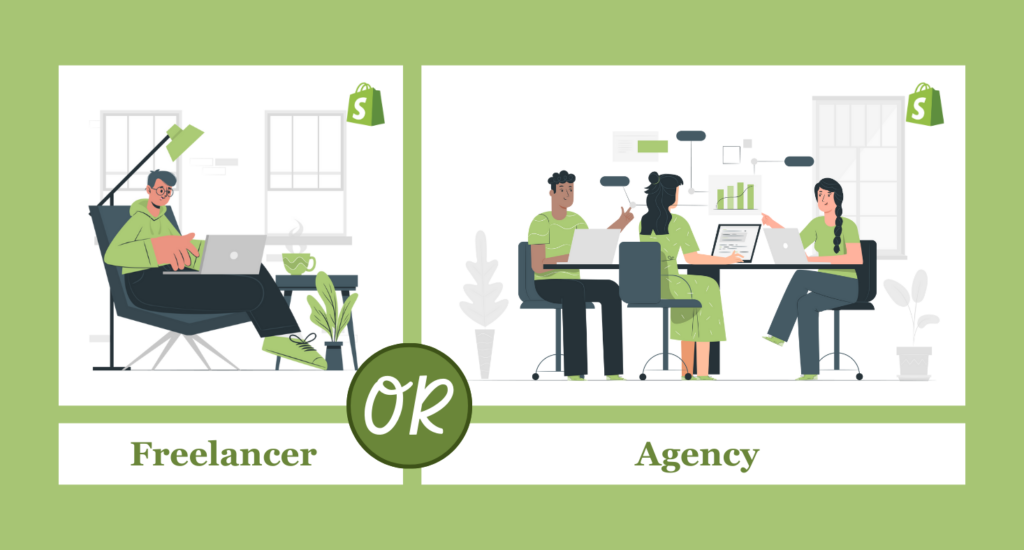
Need freelancers? Or agencies?
Don’t take this decision lightly, as it directly impacts your project’s success.
To make a better choice between them, you need to consider all the aspects that have an impact on your project. And below I’m adding a comparison table to help you with the same.
| Aspects | Freelancers | Agencies |
| Skills & Expertise | They are individual freelancers with varying levels of expertise | They are a specialized team with extensive expertise in Shopify operations |
| Range of Services | Based on the freelancer’s expertise, services can vary | Typically, agencies offer a comprehensive range of services, including development, design, SEO, and more |
| Timelines | Varies based on the freelancer’s workload and availability | Agencies often have a structured workflow, providing more predictable project timelines |
| Cost-effective Solutions | Freelancers mostly offer competitive service rates | Agencies may be comparatively costly, but they assure top-notch service quality |
| Communication | Depends on freelancers, some are excellent communicators; while others may be less responsive | Agencies typically have established communication channels for seamless collaboration |
| Client References and Testimonials | Limited to past client references and reviews | Can provide a portfolio of successful projects, client testimonials, case studies, and more |
| Project Size | Suited for small to medium-sized projects | Capable of managing projects of all sizes, from small businesses to large-scale enterprises |
So, I hope this table shares enough information to help you determine whether a Shopify freelancer or an agency can be your choice.
Once you’ve decided, we can move to the next section, which shares tricks and platforms you can use to find Shopify experts.
Where to Find Shopify Experts?
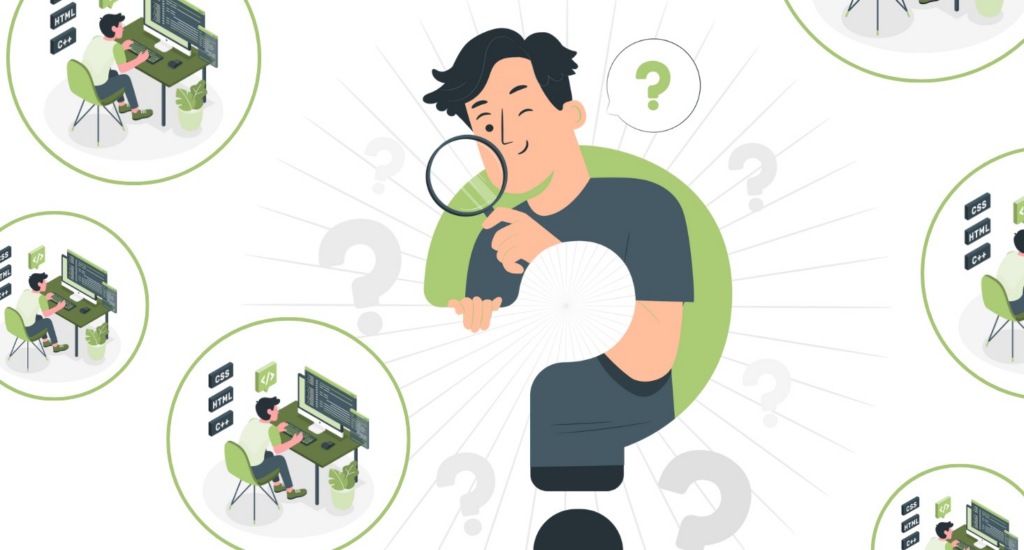
Finding an ideal Shopify expert takes significant time if you don’t know where to find them.
However, there are many cool tricks to locate and hire experts. You’ll learn about them in this section, for both, the Shopify freelancers, and the agencies.
Let’s start with it.
1. Finding Shopify Experts by Google Search
A single Google search for ‘Hire Shopify Experts’ will lead you to millions of websites showcasing freelancers and agencies available for hire. Let me recommend some keywords that you can use to get accurate results based on the service you are looking for.
For Agencies
Looking to go ahead with a Shopify agency? Here are the specific keywords you can use to spot them on Google.
- Shopify Development Services
- Shopify Development Companies
- Hire Shopify Agency
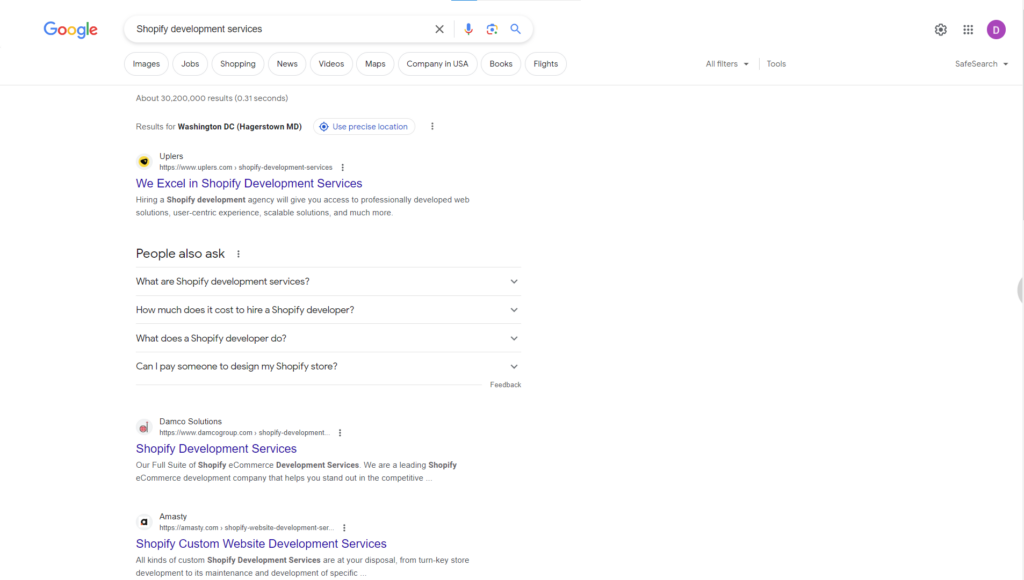
Google search results on Shopify development services
If you’re looking to hire an agency for a specific service, you can try this: Shopify + (Service Name) + Services.
Here’s an example below.
When you enter these keywords into Google, you’ll get a list of services offered by various agencies in the Shopify development space. So, start to explore and compare the options.
For Freelancers
If freelancers seem like your choice, here are some keywords that you can consider to find them with Google search.
- Hire Shopify Developers
- Hire Freelance Shopify Experts
- Freelance Shopify Development Experts for Hire
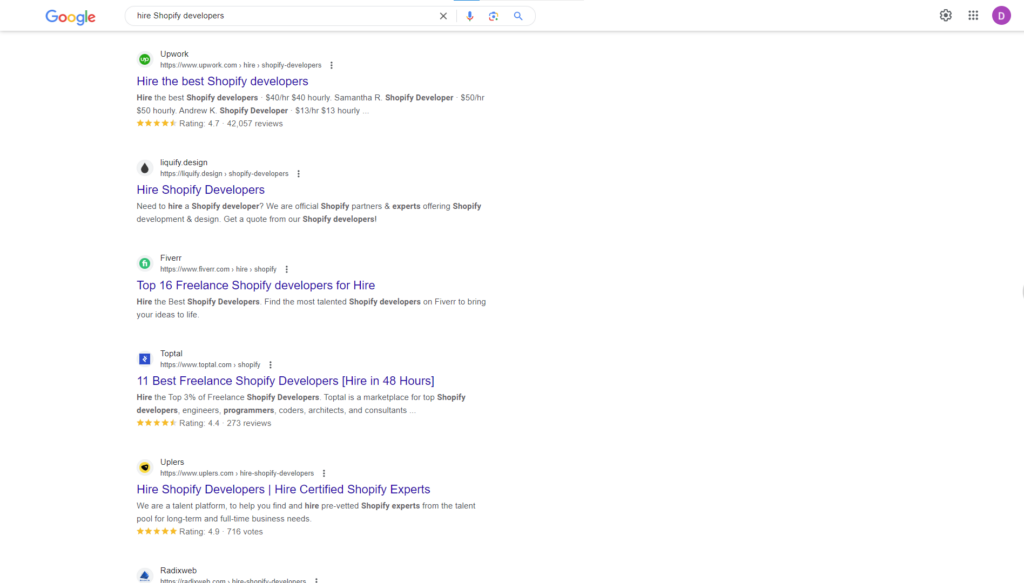
Google search results on keyword hire Shopify developers
These keywords will lead you to some of the best freelancing platforms worldwide, that can help you find the right freelance expert to do your job.
And that’s it. Now, let’s move to understand how you can find Shopify experts on top freelancing platforms.
2. Hiring Shopify Experts from Freelance Platforms
Freelance platforms are the most reliable places to hire experts. If you ask me to suggest some of the great ones, these 2 top my suggestion list.
- Upwork
- Fiverr
While Upwork helps you find both the freelancers and the agencies, Fiverr can help you find the best Shopify freelancers. Both of these platforms have the easiest methods to hire experts. And below I’m explaining how you can hire experts with these platforms.
Hire Freelance Shopify Developers from Fiverr
Hiring Freelance Shopify experts from Fiverr is easy. All you need to do is go to their website and type “Shopify” into the search bar.
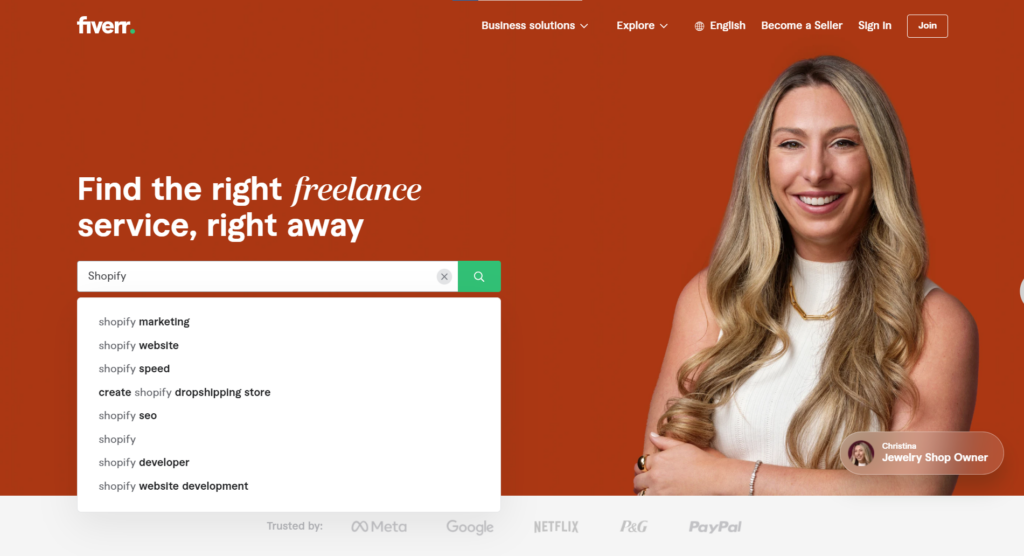
Doing this will redirect you to a page that includes a variety of Shopify service packages from Shopify experts.
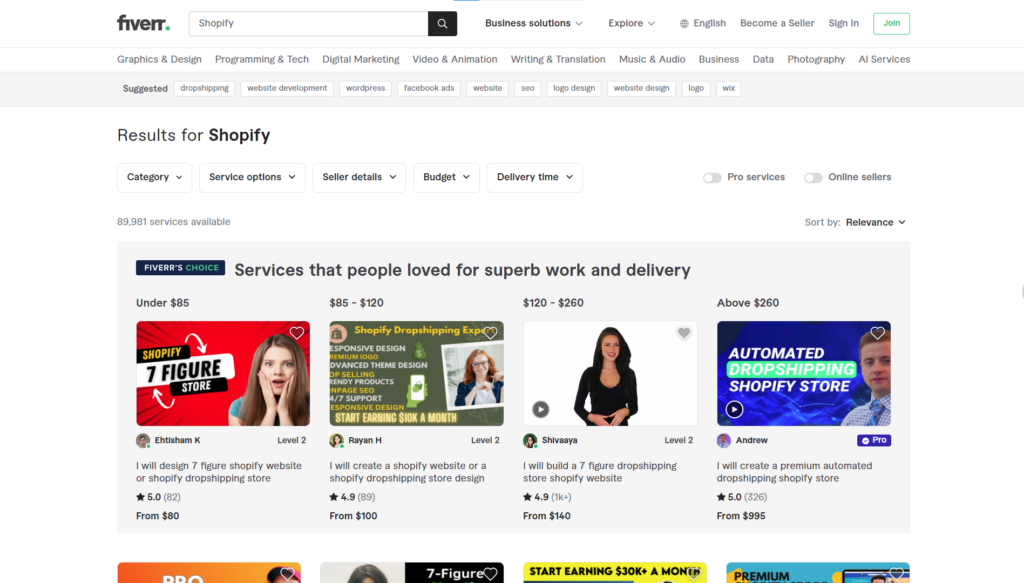
Furthermore, it allows you to filter freelance services based on:
- Service Variations
- Language
- Location
- Budget
- Delivery Time
So, once you set filters of your choice, you can compare different services by different providers and figure out the one that matches your requirements.
Later, you get an option to buy the service package directly or contact an expert for a quote or service customization.
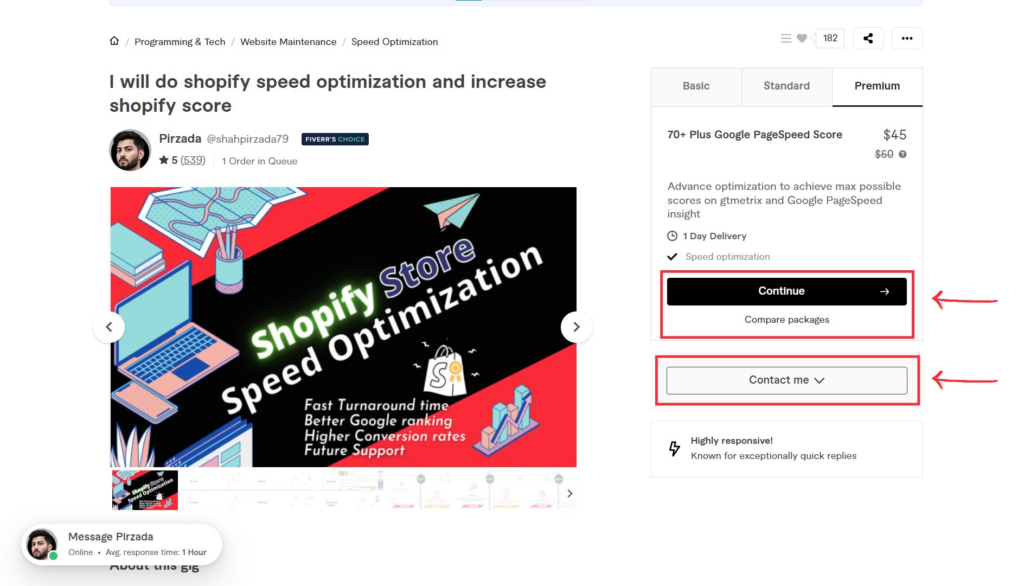
And that’s all for hiring freelance Shopify developers from Fiverr. Now, let’s check how Upwork allows you to hire Shopify experts.
Hire Shopify Developers from Upwork
As I said earlier Upwork allows you to hire both freelancers and agencies. Let’s jump to understand the process for hiring them.
To hire experts from Upwork, search for the term “Shopify Developer” in the search box placed in the website header.
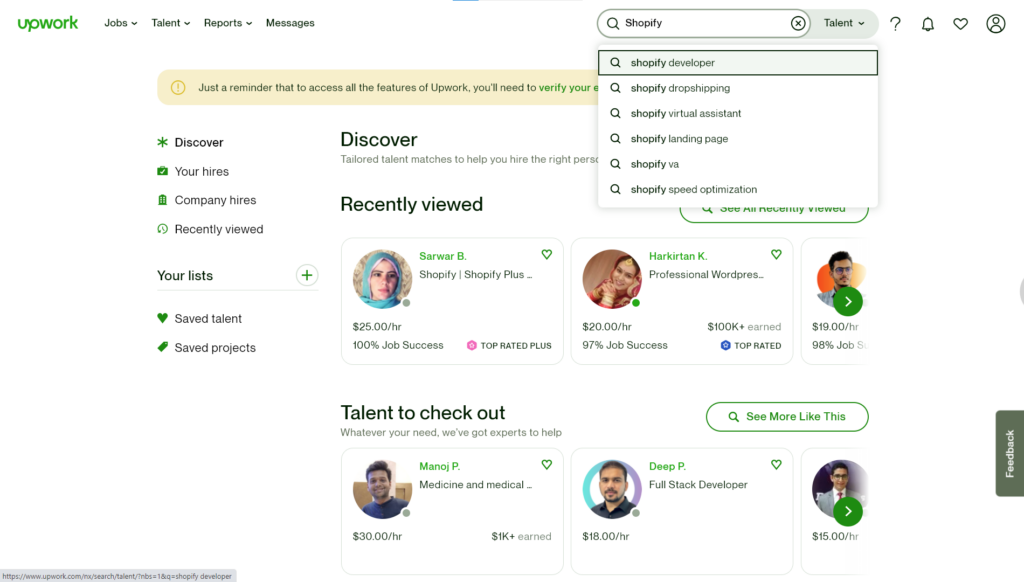
This will bring you to the results page that includes a list of top Shopify freelancers or agencies on Upwork. This includes an option to filter out freelancers based on:
- Talent Type (Freelancer, Agency, Or Both)
- Hourly Rate
- Skills
- Location
- Work Categories
- Job Success Rate
- Earned Amount
- Hours Billed
- Upwork Talent Badge
- English Level
- And Other Languages
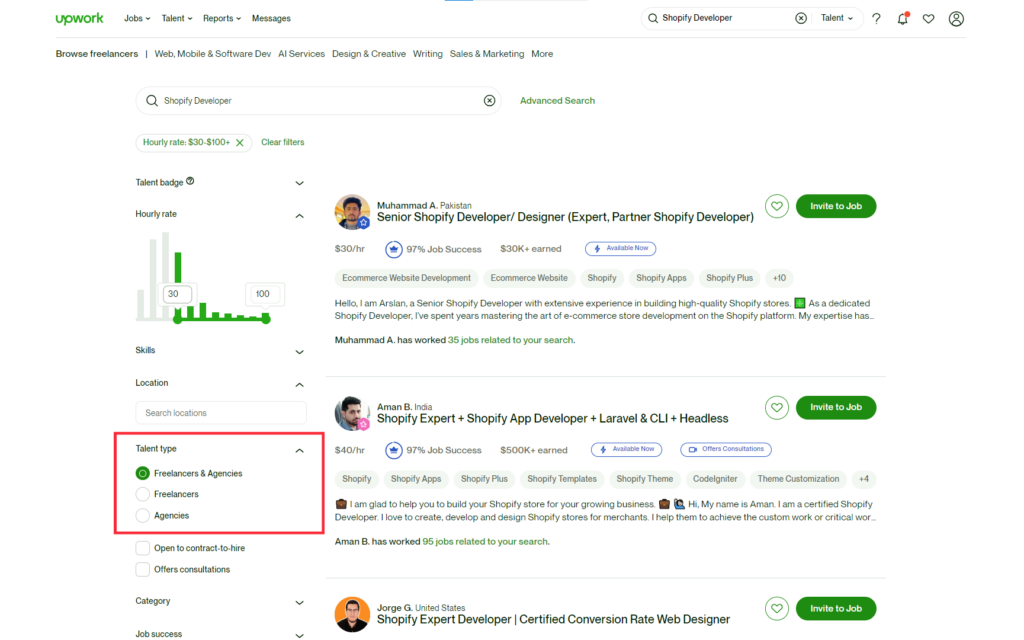
Once you set up filters of your choice, you can visit their profiles individually, to understand their skills and work history better.
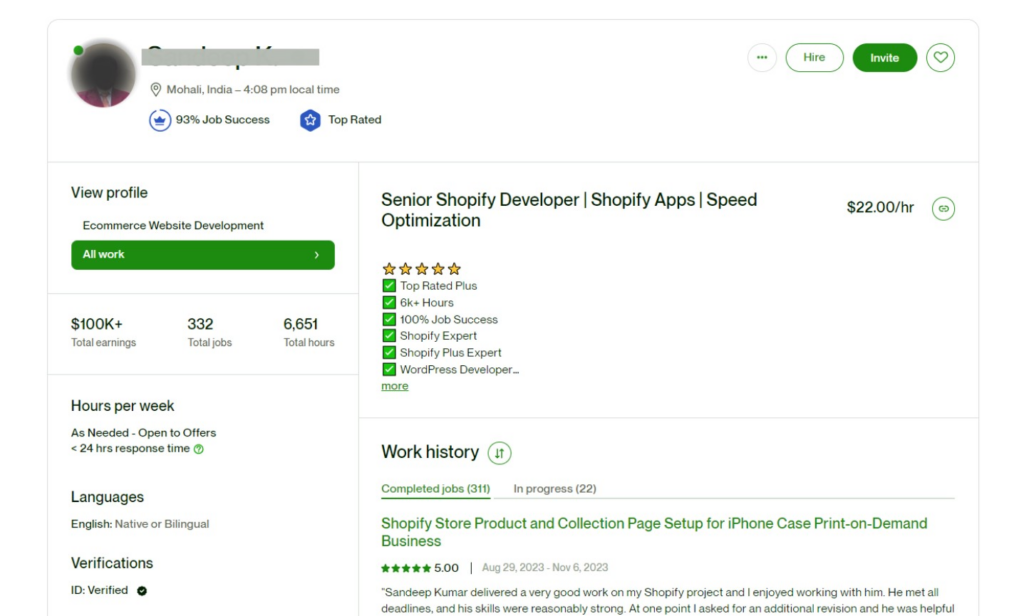
And this was all about hiring freelancers and agencies from Upwork, and other freelancing platforms that we discussed. Now, let’s move to another method to locate Shopify experts.
3. Hiring from Shopify Experts Marketplace
Shopify has its directory named “Shopify Experts Marketplace“, which includes certified partners (agencies) skilled in various aspects of development. So, if you’re looking to hire agencies certified by Shopify itself, you can check out the hiring process below.
To start with the process, visit their official page.
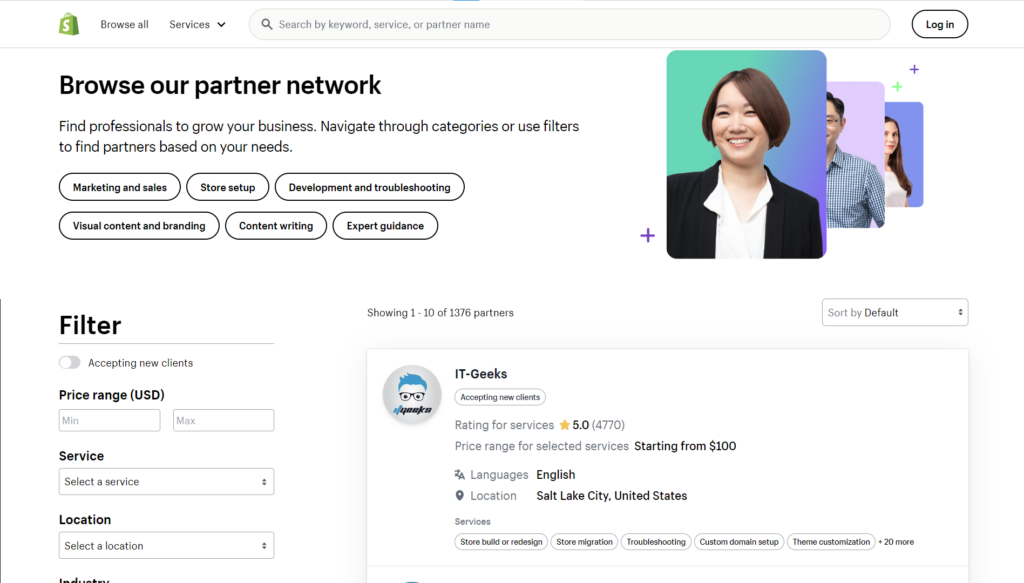
The official page of the Shopify expert’s marketplace provides you with an option to filter out experts based on:
- Price Range
- Type of Services
- Location
- Industry
- Language Spoken
So, once you set filters, get ready to individually visit profiles of agencies (partners) and gain a better understanding of their skills.
Moreover, their profiles will include their contact details, along with an option to contact them directly through the Shopify marketplace.
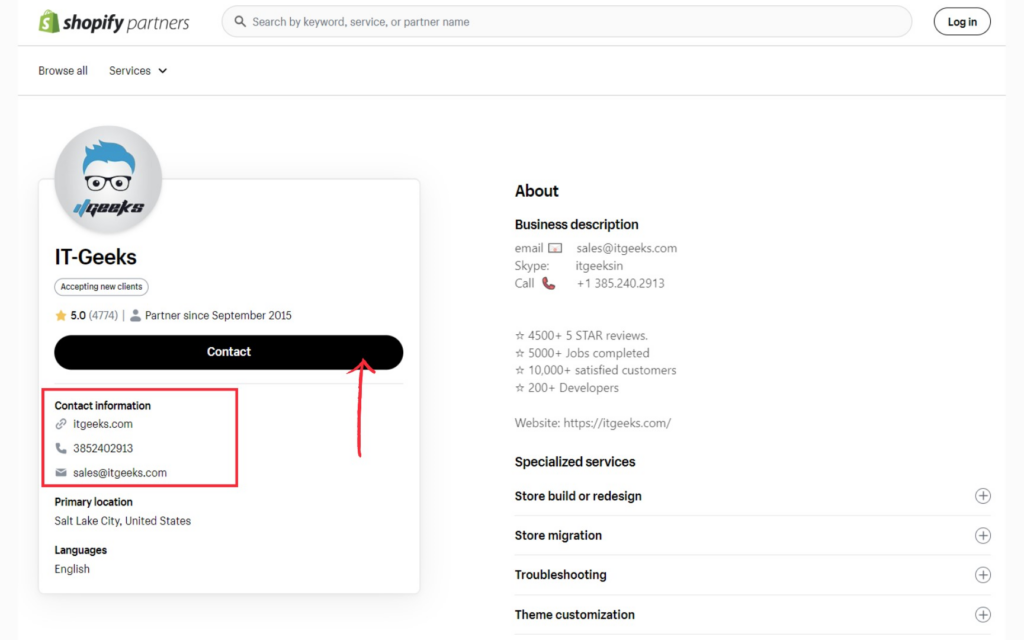
4. Creating a Job with your Shopify Store Requirements
Instead of contacting experts one-by-one and discussing your requirements differently with each of them, many freelance hiring platforms allow you to create a job post.
This is where the experts come to you to discuss your project. It’s full of convenience, as you only need to specify what you need, and you’ll still get a list of interested candidates to help you with your job.
Here’s a list of freelancing platforms that allow you to create a job post.
- Upwork
- Fiverr
- Guru
- PeoplePerHour
- Toptal
… And more. Out of all the freelancing platforms, I prefer Upwork. So, let’s check out the step-by-step process of creating a job post on Upwork to hire freelancers and agencies.
Step 1: Sign in to Upwork as a client, hiring for a project.
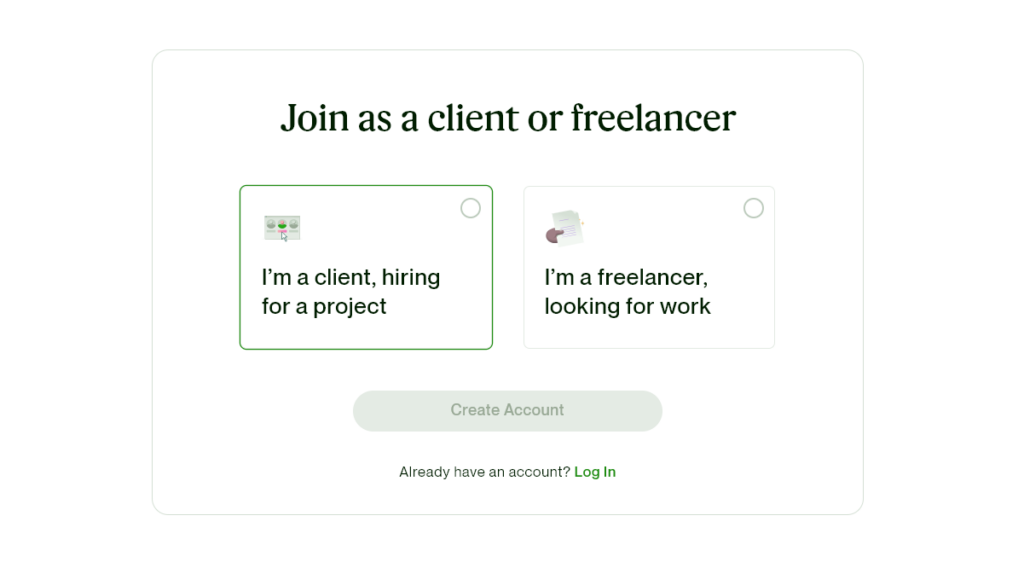
Step 2: Continue with the account creation process, which also offers social login options for quicker registration.
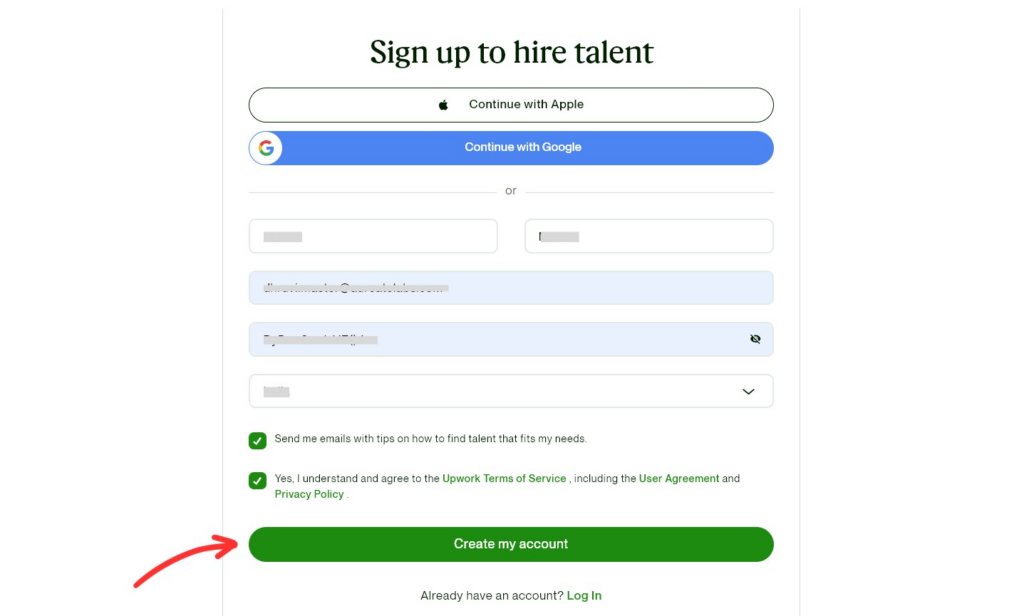
Step 3: After signing in, you’ll be asked to write your job post. The good thing is — Upwork provides an option to use AI to create your job post, so opting for that will make your process quick.
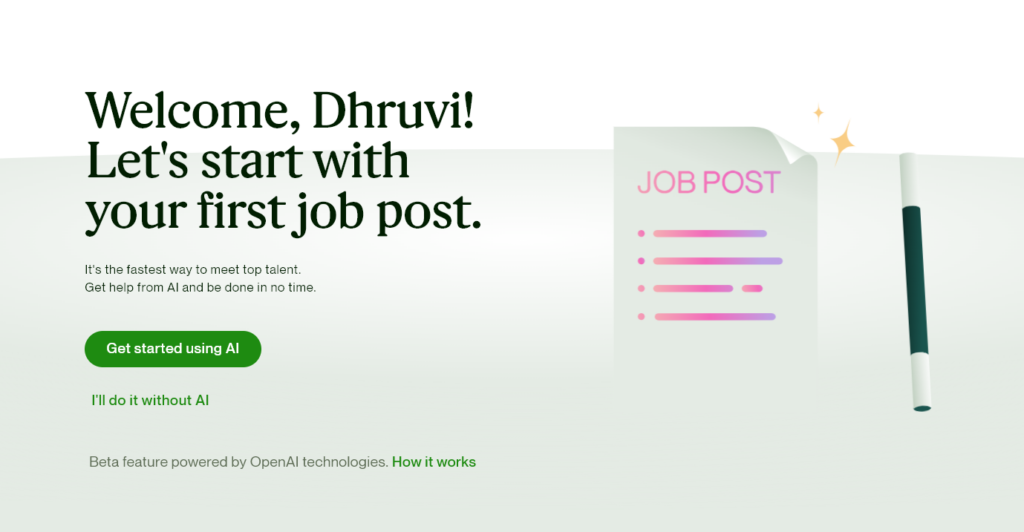
Step 4: Once you’ve used the AI to create your job post, you’ll be asked to describe your job role in 1-2 sentences. So, provide a short job description and proceed.
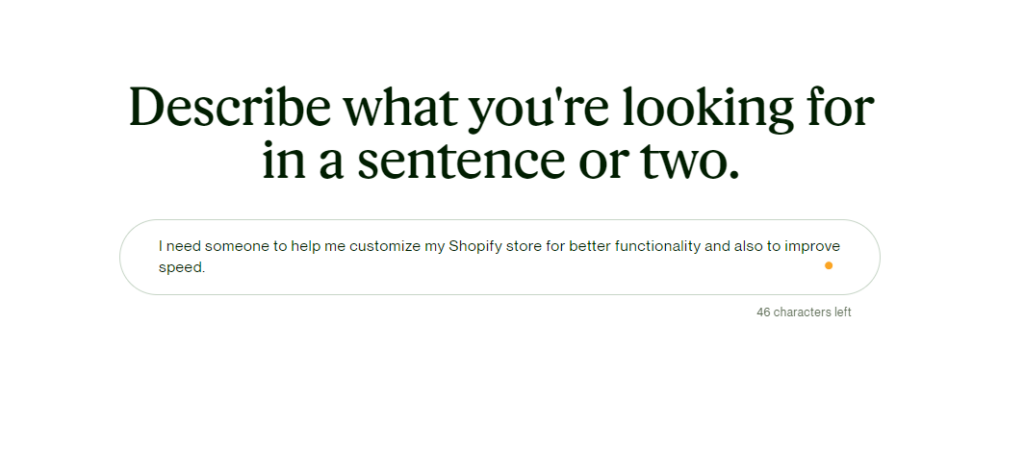
Step 5: Next, set an hourly rate or fixed price that you’re willing to pay for your project. Adding an approximate budget is not about committing to that amount; it is asked to help Upwork find relevant candidates. You can negotiate project fees with a freelancer or an agency later during the selection process.
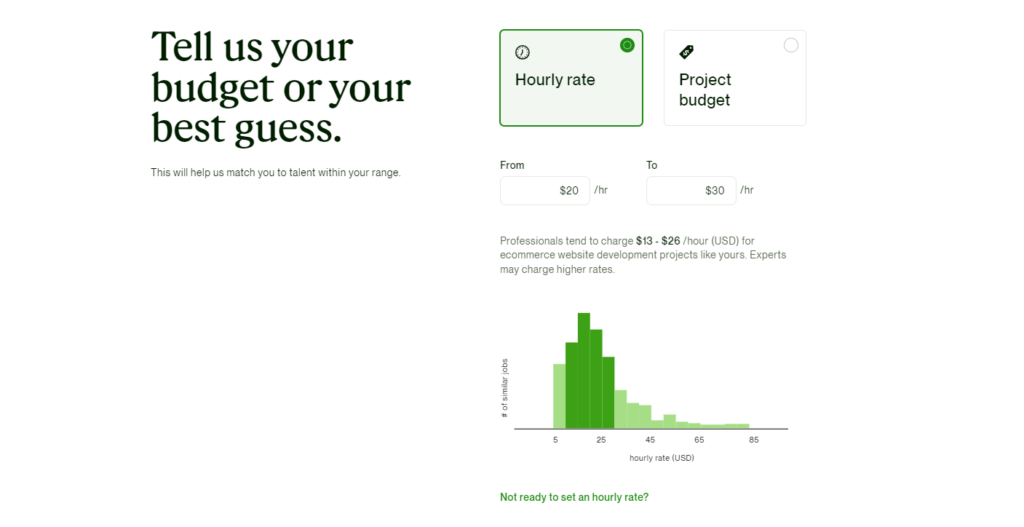
Step 6: After clicking “continue”, Upwork will provide you with a well-drafted job post. You’ll also have the option to review and customize the information to match your specific requirements.
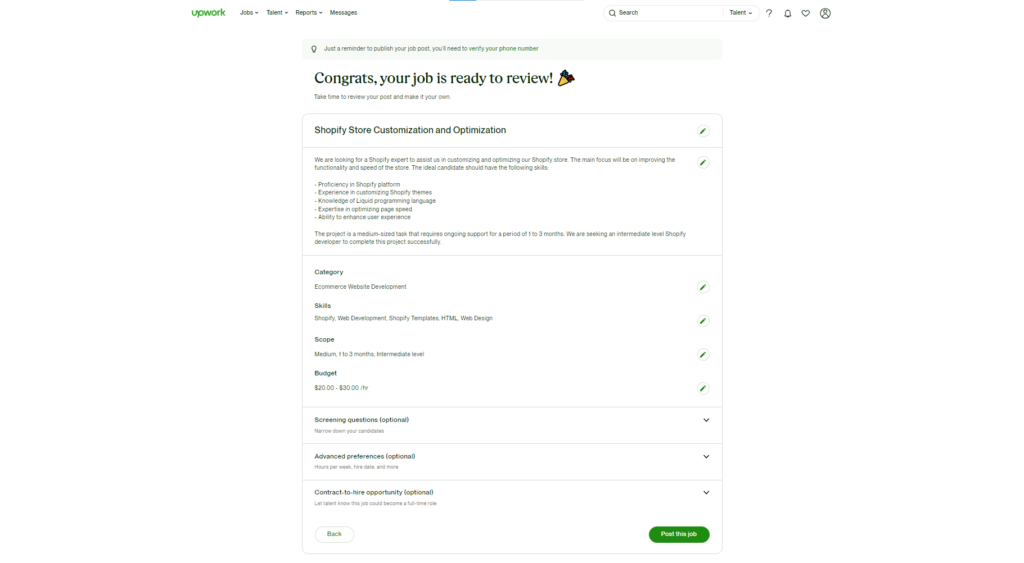
Step 7: Once you’ve verified all the information, you can publish the job post.
And Yes it was this easy to post a job on Upwork. Moreover, here’s a sample job post from an Upwork user:
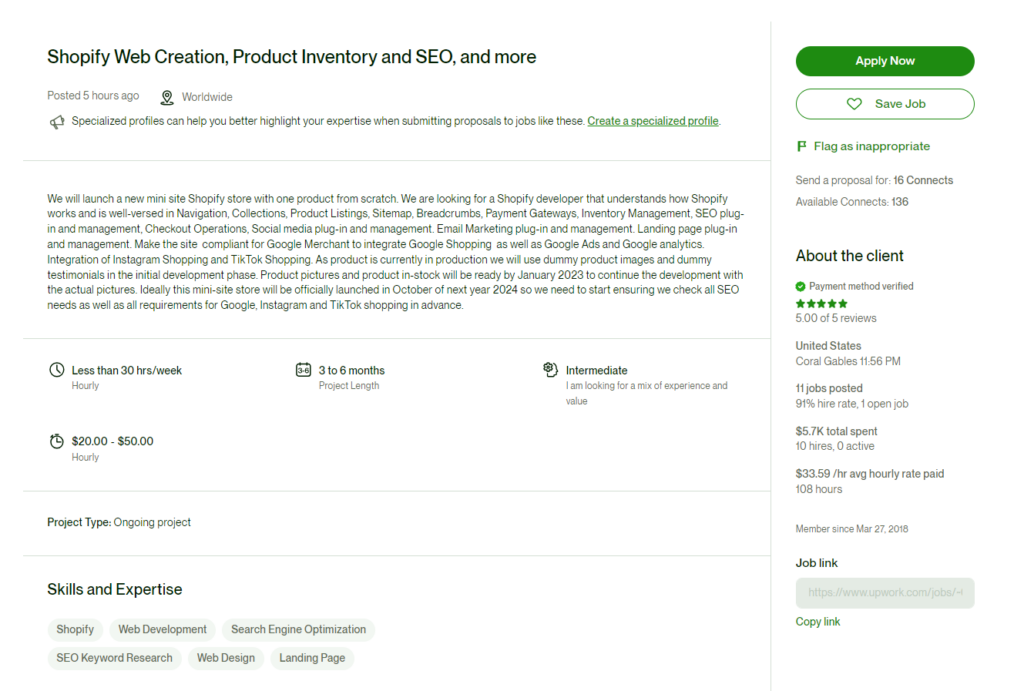
Now that we’ve understood how you hire through the Upwork job post, let’s dive into another effective way to find a Shopify expert.
5. Hiring Dedicated Developers from Shopify Agencies
This one is my favorite because here we have the perks of hiring both, “Freelancers” and “Agency”.
Most of the time, freelancers don’t seem like a fit, and the agency comes with a huge price tag. What if you can get reliability at an affordable cost?
Yes, you heard that right. Hiring developers from Shopify agencies dedicated to your project gives tons of benefits:
- Team Collaboration: Agency teams collaborate, offering diverse skills and a more comprehensive approach than individual freelancers.
- Scalability: Agencies can quickly scale resources as needed, avoiding the hassle of finding additional freelancers.
- Consistent Quality: Established processes in agencies lead to consistent and higher-quality work compared to freelancers.
- Reliability and Accountability: Agencies, driven by reputation, are more reliable and accountable, meeting deadlines consistently.
- Diverse Skill Sets: Agency teams offer a range of skills, covering design, user experience, and development for a well-rounded project.
- Long-term Support: Agencies often provide ongoing support, ensuring continuous improvement for e-commerce projects.
- Risk Mitigation: Agencies can swiftly replace developers, reducing project risks associated with freelancer unavailability.
So, my inner voice says whether you need a standalone Shopify expert or a team of experts, a Shopify development agency is the best choice!
Well, that’s all for hiring a dedicated Shopify expert from an agency.
Until now, we learned where you can find Shopify experts and the process to hire them. And it’s time to move to another section that talks about finding the RIGHT EXPERT for your unique Shopify needs. It’s going to be an interesting section, so let’s get started with it.
Evaluating Shopify Experts Before Hiring Them
We learned ways to find experts, and at this point, you have a long list of freelancers and agencies. But you don’t know any of their green flags and red flags. So, let’s follow an in-depth evaluation process to finalize the best Shopify agency or freelancer.
To get started with the process, list down Shopify freelancers or agencies that seem like your choice, in a spreadsheet template just like below.

Template to hire Shopify Experts
I’m only considering agencies, but you can follow the same route for freelancers as well. Some criteria may differ while evaluating freelancers, so check their possibilities before you list them.
To make your process easier, I’ll follow the steps along with you. Let’s get started.
Note: The calculation will include approximate ratings.
Step #1: Check Their Local Presence
Reach out to Google and see if the Shopify agencies you’ve prioritized are easy to discover in their locality. It’s particularly helpful when you’re interested in hiring from your own city or a specific location.
Moreover, if they pop up in local searches, it shows that they are skilled in SEO and marketing. Why does that matter? Well, their proficiency in SEO can be beneficial for your store marketing and sales in the future.
Just type in these keywords to track them next to you or in a particular city.
- Shopify development agencies near me
- Best Shopify development company + city name
- Top Shopify development company + city name
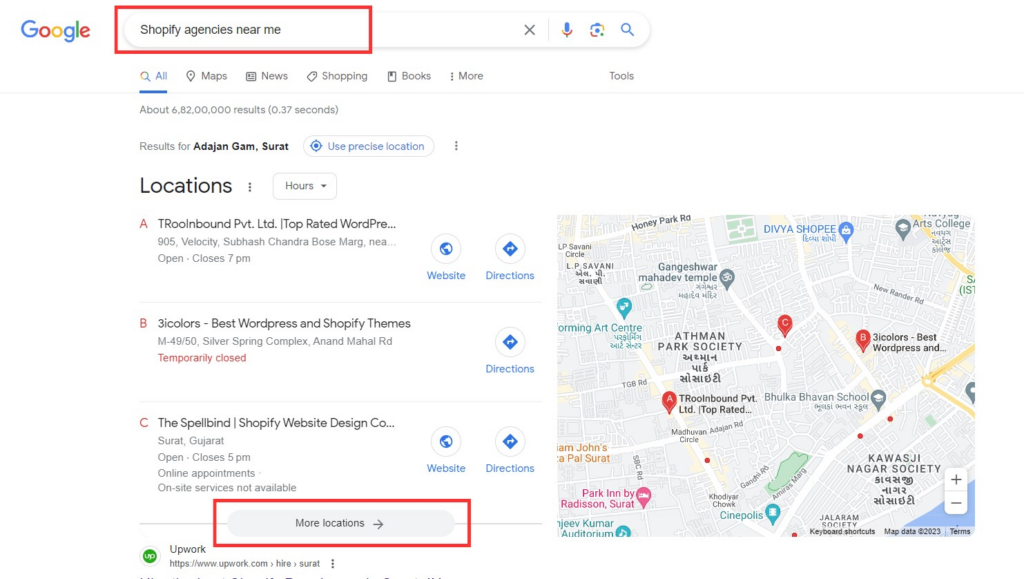
You can click on “more locations” at the bottom of the page to explore more of the listings.
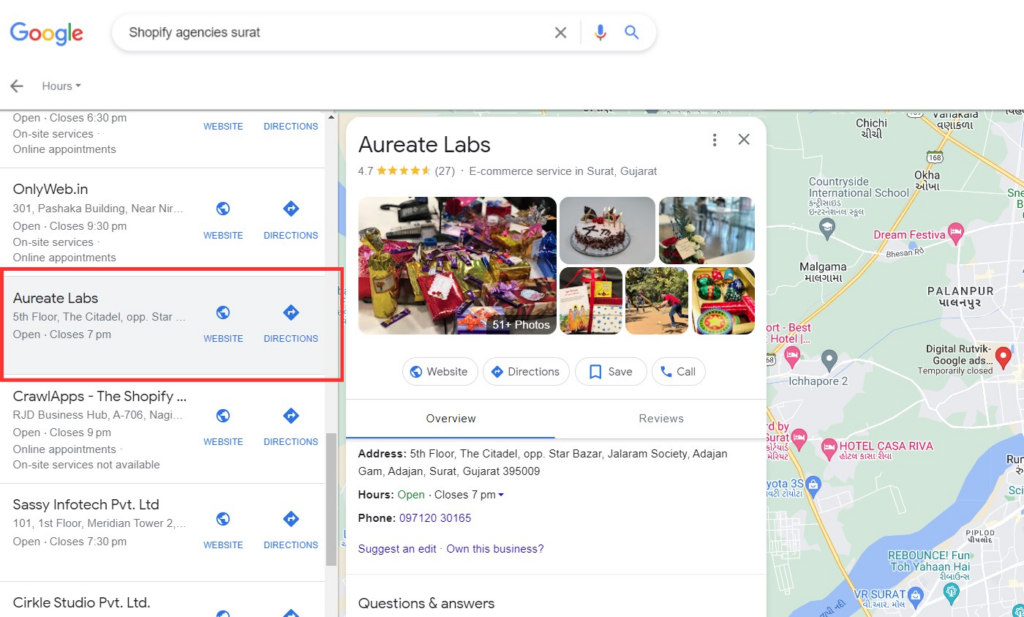
Here’s how you can add ratings.
- Rate 0: If the Shopify agency is nowhere to be found in any local terms
- Rate 3-4: If they pop up in one or two local terms.
- Rate Perfect 5: If they’re visible in each local keyword.
That’s the golden standard!
Here’s how I added ratings for the agencies that I listed.

Step #2: Take a Deeper Look at Their Portfolios
Checking the projects (i.e.; the client websites) they’ve worked on will give a clear idea of their work quality. So, visit the client websites from agencies’ and freelancers’ portfolios and try to experience each of them like a normal user.
And yes, many Shopify agencies also specialize in other eCommerce platforms like Magento and BigCommerce, so their portfolio may cover projects for all eCommerce platforms. Therefore, focus on checking website traffic for Shopify projects specifically.
If you’re wondering how to determine the eCommerce platform, you can use a tool called BuiltWith. Just enter the website URL, and it will provide you with all the relevant information.
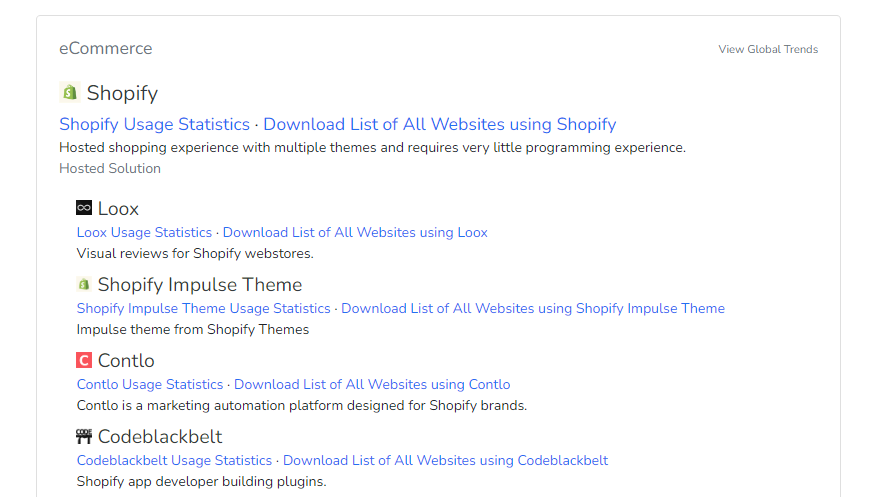
Identifying eCommerce builder for one of the client projects
Once you confirm that the eCommerce platform is Shopify, you can start to explore their portfolios.
I’ve divided the scoring for the portfolio into 4 parts.
1. Portfolio and Niche
Seeking work experience in a similar niche is highly beneficial.
So, make sure to check out their portfolios for experience in your business industry. Aureate, for example, has experience in a beauty and skincare niche. If you work in the same industry, this is a green signal.
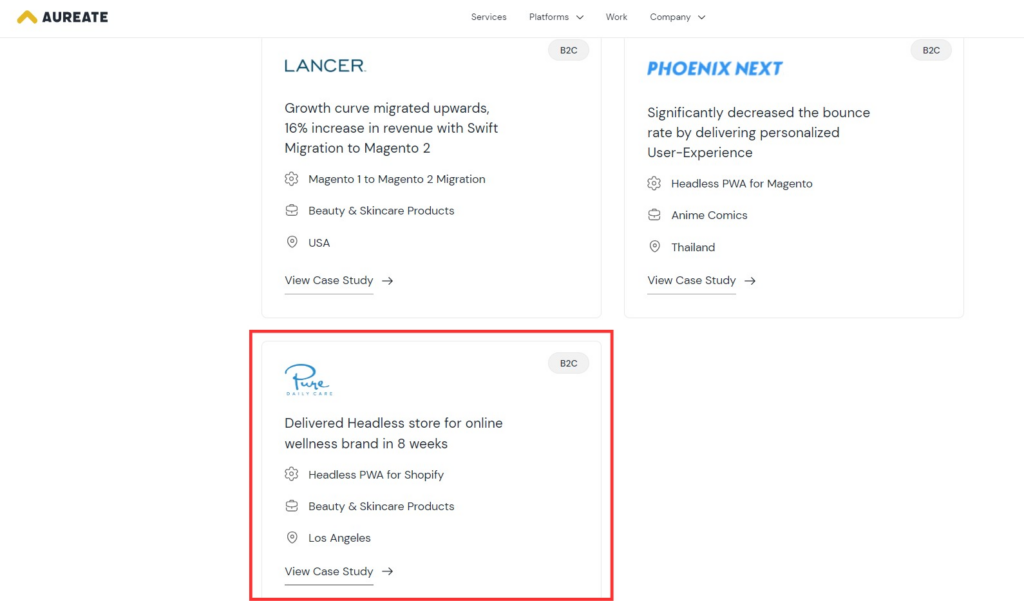
Work Portfolio of Aureate Labs
This is how you can add your scores.
- Rate 3-4: If they don’t have experience in your industry
- Rate 5: If they have experience in the same industry
In my case, I wanted to make a website in the beauty and skincare industry. And here I’ve added scores according to that.

2. Numbers Game
The second thing you do is go through the numbers they showcase in case studies. However, there are chances that these numbers are inaccurate, they will at least give you an idea of the work quality that you can expect from that freelancer or an agency.
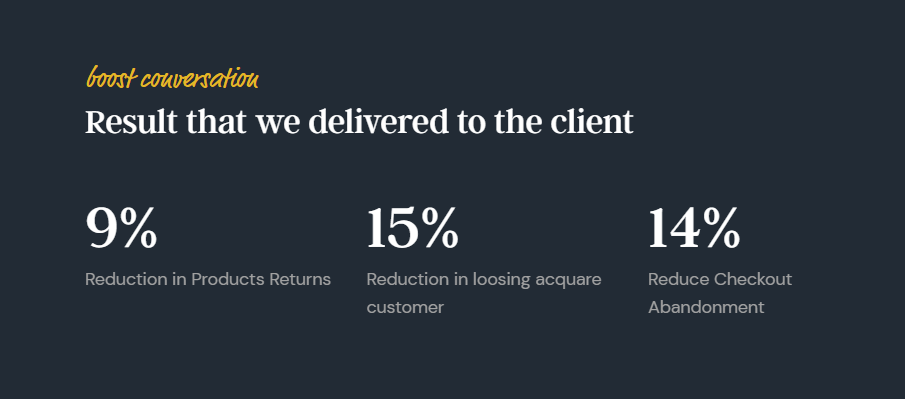
Stat results by the Shopify development company
So, start to read their case studies carefully. And you can rate them based on the numbers they claim. Below is how you can add your scores.
- Rate 3-5: if they have impressive result numbers in their case studies
- Rate 0: If they don’t have case studies
Here’s how my scoreboard looks now.

3. Website Traffic
The traffic of websites in the portfolio is the true indicator of the popularity and effectiveness of the developer’s work. You can then use Ahref’s Website Traffic Checker tool to check traffic on client websites.

It’s a free-to-use tool that shares organic traffic numbers of websites. When you analyze traffic, ensure they have their traffic numbers increasing year by year. It indicates that during the service period of that agency, their website experienced growth.
Here’s how I added scores for each of the agencies.

4. Website Speed
It’s incomplete to test portfolios of Shopify agencies without checking the website speed and performance. To check website speed, Google’s PageSpeed Insights tool is the best option.
All you need to do is select some client projects and analyze their website URLs in the tool.
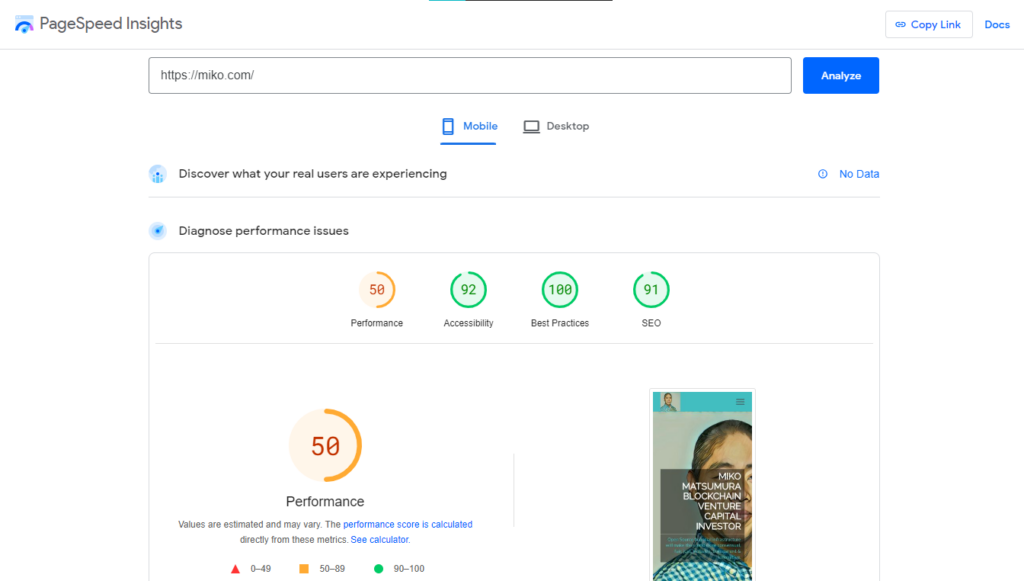
According to Google, a score of 90 or above is good, 50 to 89 needs improvement, and below 50 is considered poor.
Here’s how you can add scores for performance criteria.
- Rate 1-3: If mobile performance is <50, and desktop performance is between 50-60
- Rate 4: If mobile performance is >50, and desktop performance is between 60-80
- Rate 5: If mobile performance is >50, and desktop performance is more than 80
I checked 2 Shopify websites from each agency portfolio, and here’s the fresh scoreboard.

Step #3: Analyze Patterns In Their Testimonials
Testimonials are the next thing to look at. While you check testimonials don’t get convinced by their quantity, you need to check their quality. This is because there are thousands of websites that can generate fake testimonials within a snap.
Here’s an example of how easy it can be.
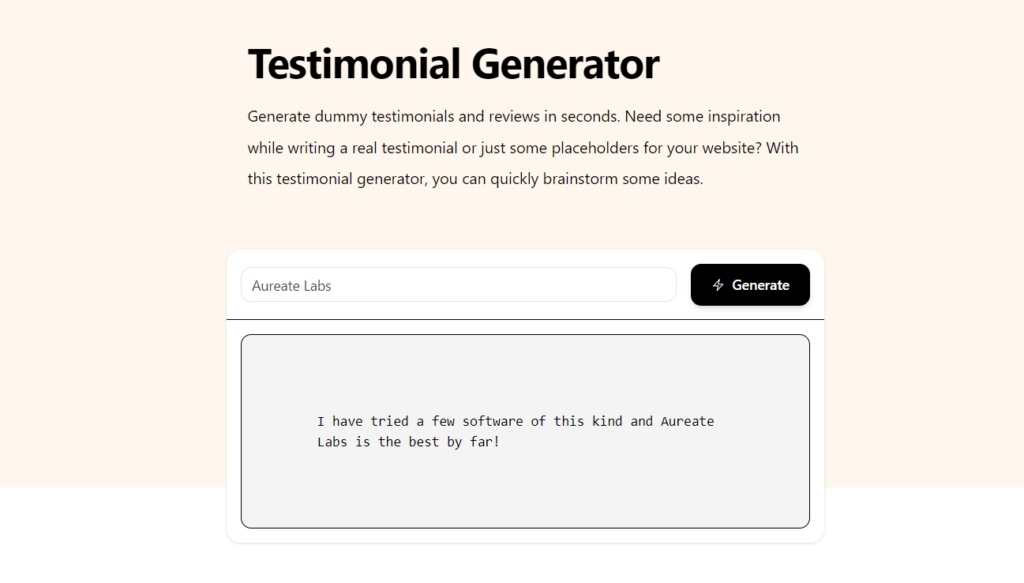
Example of a fake testimonial generator
Yes, a mention of the agency’s name and a click to generate, is enough to have a dummy testimonial.
I’m not conveying that all the testimonials added by agencies are fake and dummy. But it’s necessary to identify the real ones cross-verifying LinkedIn profiles of reviewers.
Let me share an example.
Choose a testimonial that includes details about a client, such as their name and brand.
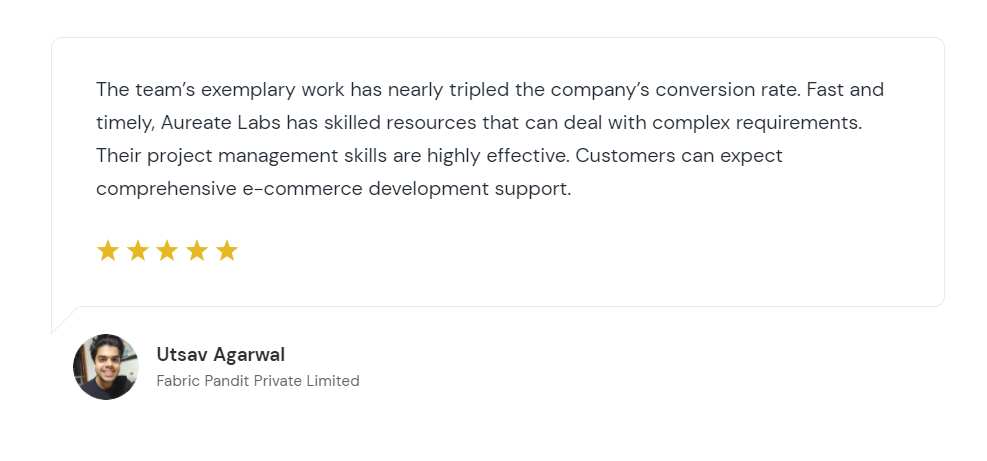
Afterward, check their LinkedIn profile.
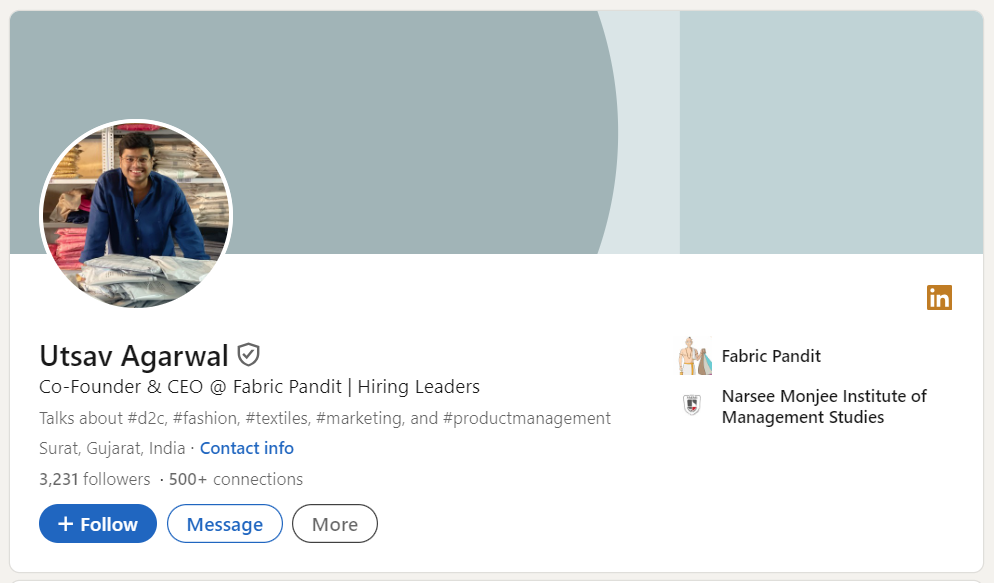
If you find a genuine profile of that person on LinkedIn, it simply verifies that the testimonials presented by the agency are genuine. Furthermore, you can also message the client to verify the authenticity of the testimonial.
I checked 3 reviews per agency and here are the scores that I added for them.

Step #4: Check Online Reviews
Website testimonials can be added by the agencies themselves. However, on platforms like Google and Clutch, you can find authentic customer reviews as they can’t modify them.
To check reviews on Google, simply type in the name of the agency in the search bar. You’ll then see their Google My Business (GMB) listing, with an option to check customer reviews.
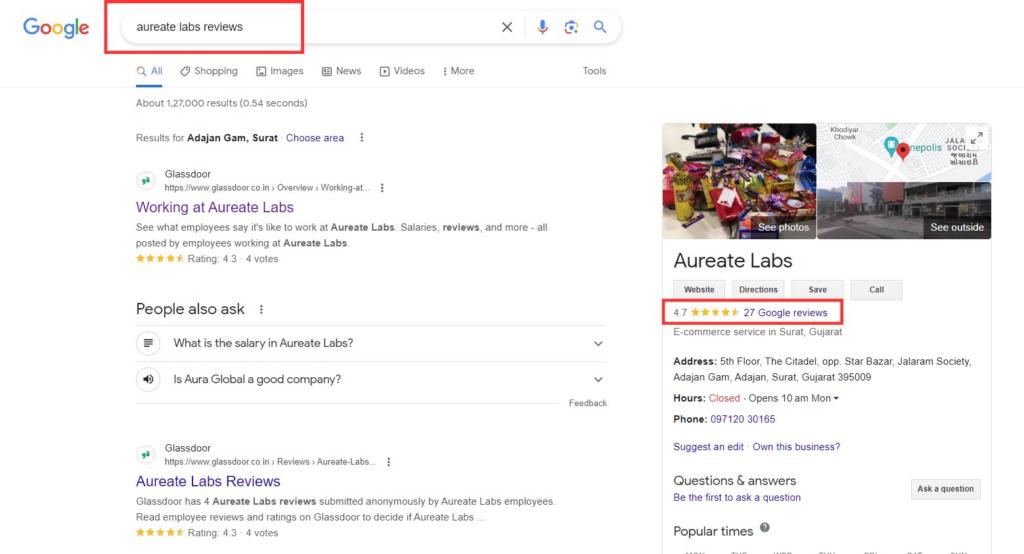
Go through the reviews once and note down the number of reviews they have got, along with rating numbers.
And move to find more reviews on Clutch, and Glassdoor.
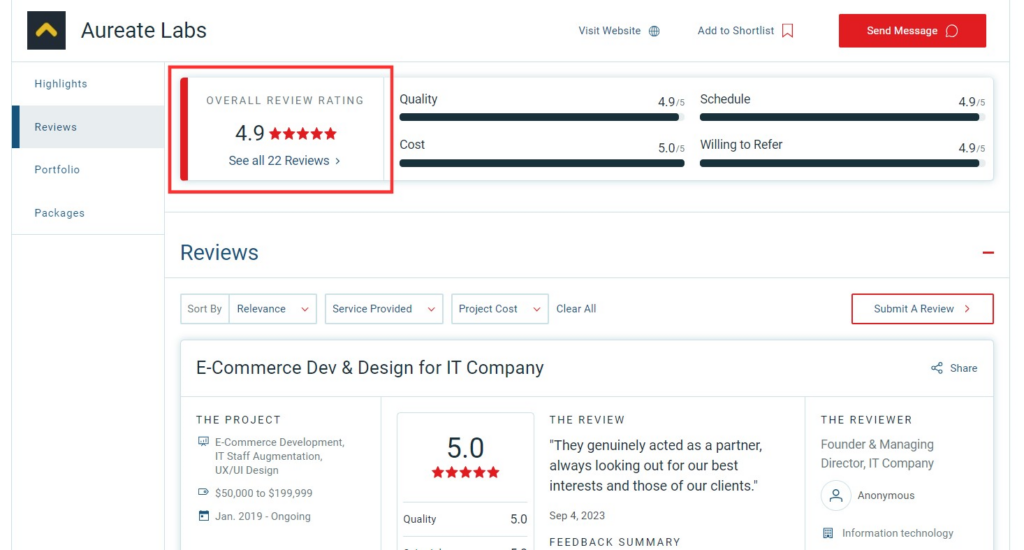
Check the reviews for all the agencies, note down their average ratings, and put-up scores accordingly on the sheet. For freelancers, you can check reviews on freelancing platforms such as Upwork, Fiverr, or any other platform where you choose to hire them.
Most of the agencies that I considered have good ratings. Here’s how my scoreboard looks now.

Step #5: Find Out More About Their Work Culture
When you’re hiring a Shopify agency, look for a work buddy, not just a service. They’re going to work with you for a long time and your work styles should match.
Here, I’m not asking you to find a match for each detail, but at least the work ethic should match. So, try to find out more about the team members you’re going to work with, start with their LinkedIn profiles.
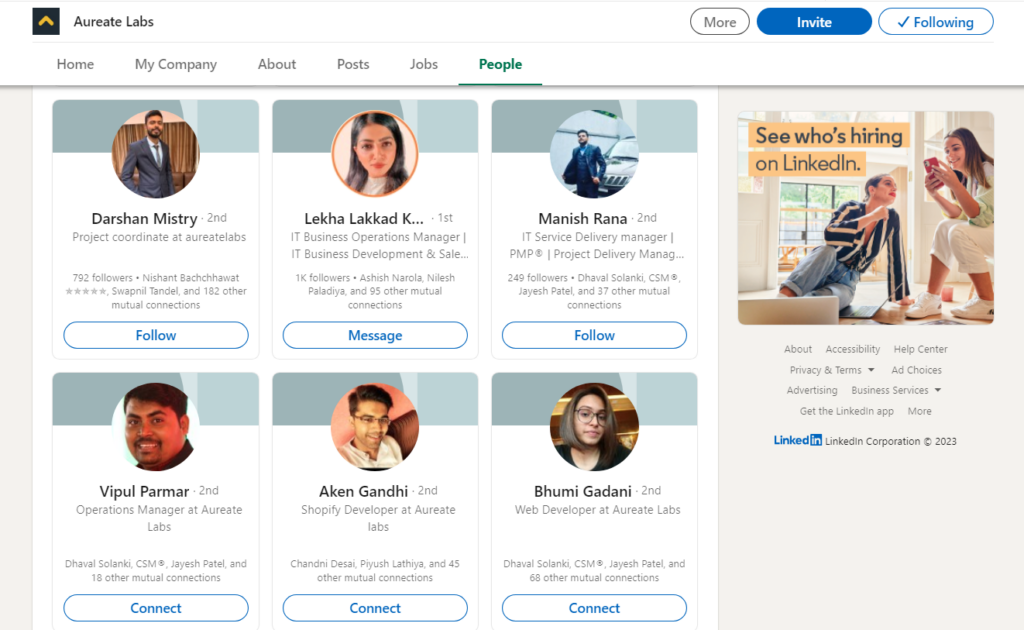
Learn more about the company’s working atmosphere and how team members are treated. This is because the mental stress of the developers ultimately reflects on the output of your project.
So, rather than just finding happy reviews from clients, try to spot the happy faces of employees. And you can easily do it by just reaching out to their LinkedIn and Instagram profiles.

You can go research for your agencies, and rate them as you see happy faces.
Once more, most of the companies I’m considering seem to have a great atmosphere, so, I’m adding the full scores for each.

Step #6: Observe How They Interact With Customers
The way of interaction speaks a lot about the work ethic and behavioral qualities of Shopify service providers. So, always check how they respond to customer queries in general.
- Look at the comments on blogs and articles to see how well they are answered
- You can check how they communicate on their social media handles
- See how fast they react to user-generated content
If you find agencies that don’t reply, you can deduct their scores. They may have their reasons, and I’m not asking you to be a judge on what’s fair and what’s unfair. But do consider their way of interaction, as it shows how open they are to communicating and resolving queries.
Here’s what the scoreboard looks like now.

Step #7: Figure Out the Additional Services They Offer
We hire agencies to work on our different operations. If you’re hiring for store development, you may require an agency to work on other services as well. For example, you need an agency for support and maintenance after they develop your store.
The thing is — you can certainly hire different agencies for different operations. But, I’d recommend choosing an agency that offers 360-degree solutions. This is because you need compatibility between different work solutions, and when the operations are handled under one roof, it helps increase work quality.
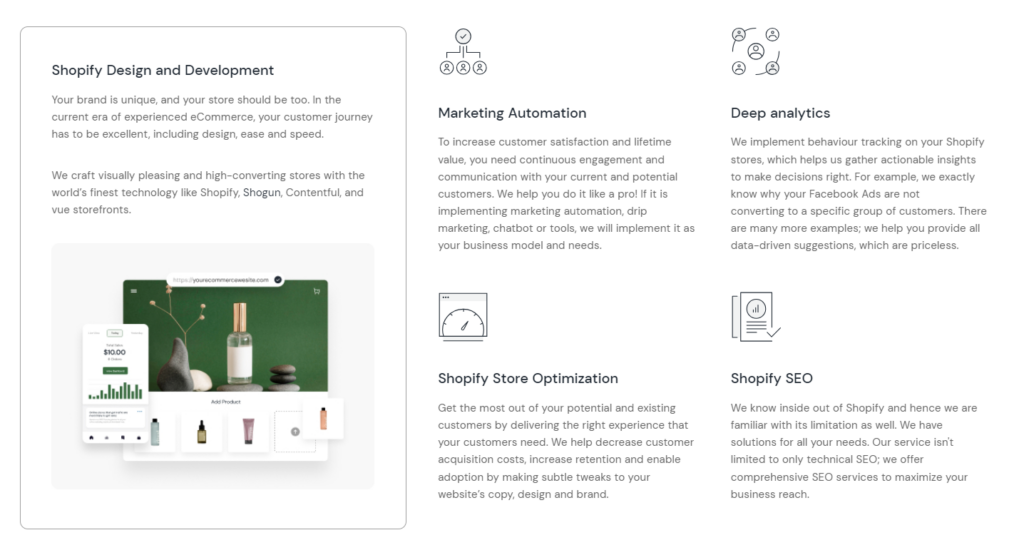
So, do check a variety of services provided by agencies that you’re considering and add ratings depending on the services that you prefer.
Here’s my rating.

Step #8: Dig Into Their Certification
Shopify certifies agencies for having specific expertise in the platform. To check if an agency is a certified Shopify partner, simply head to the “Shopify Experts marketplace”. Type in the agency’s name in the search box, and if they pop up, mark them as certified.
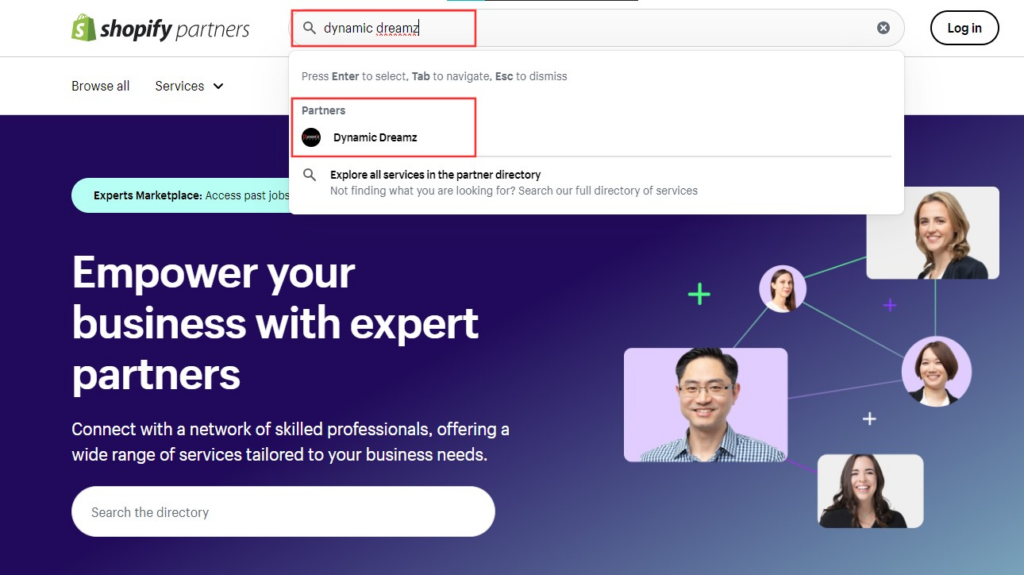
Not a huge fan of certifications, as I believe a Shopify agency’s skills are better showcased in its portfolio. But for a fair comparison, it’s important to factor them in.
Once you’ve done that, award full scores for each agency certified by Shopify.
Here’s my scoreboard.

Step #10: Determine Their Experience
It’s necessary to consider the years of experience an agency has when hiring them, as it validates their expertise and their ability to deliver quality work.
You can find out their experience on Clutch.
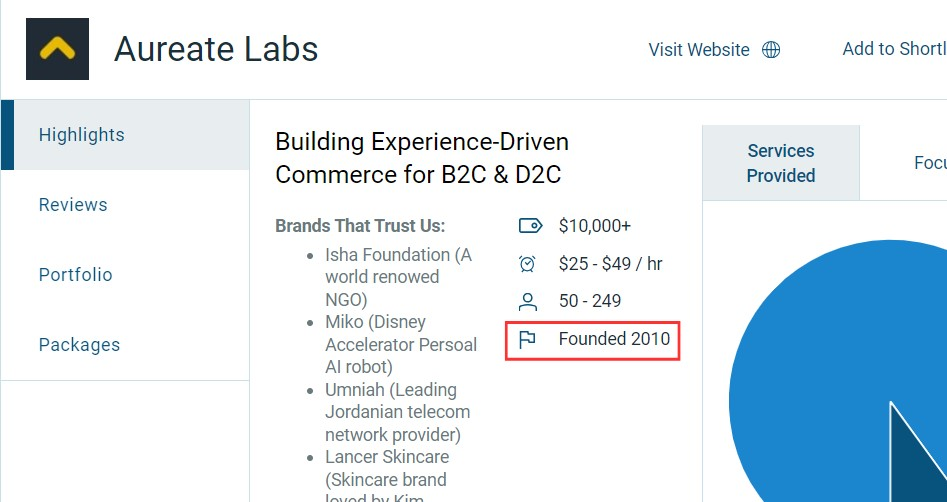
Now, you can follow this process for each agency that you’re considering. I did my work, and here’s what my scoreboard looks like now.
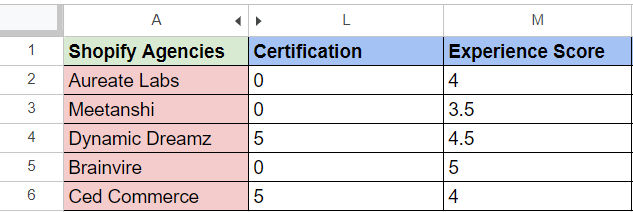
Step #11: Have a Call with the Expert
So, finally, after all that research on agencies and freelancers, it’s time to push that ‘Contact Us’ button and schedule a meeting with them.
To learn more about them and their approach to your project, ask some common questions I’ve listed here.
- What’s the estimated project duration?
- What pricing model is most suitable for the project?
- Do you have experience in my specific industry? If not, how do you conduct research?
- Will I be part of the team meetings?
Once the meetings are done, you can ask yourself some questions.
- How did the meeting go?
- Was the Shopify expert transparent about all the questions you asked?
- Did they ask any questions to try to understand your project better?
The key to a good partnership is the transparency they maintain in communication, so check how transparent they are when answering these questions to you. Once you self-verify these areas, you can assign scores to each of the agencies, depending on your experience of having meetings with them.
Here are my approximate scores for each of the agencies.

Step #12: Ask For a Sample Test
In my suggestion, store owners should always prefer asking for sample work before hiring any agency or freelancer for their project requirements.
The biggest concern is that if the work ethic or the developer’s expertise level doesn’t match what is required for your project, it’s hard to get out of contracts.
So, during the meetings, ask them if they are ready to work on short-term or sample projects at the start. Most agencies and freelancers would agree to it. You can deduct scores for agencies and freelancers who push for a long-term commitment without agreeing to work on sample projects.
Here’s how you can do that.

Step #13: Post-Development Customer Service
When you interview agencies and freelancers, ask them if they provide post-development support.
Ongoing assistance is necessary because even when everything seems fine during project delivery, issues could still pop up in the days or weeks following that.
So, it’s a good idea to check with your agency if they offer help when something unexpectedly pops up after the paid service. After confirming with them, you can add your scores.
All the agencies that I’m comparing do provide post-development support for a few months after development. So, I’ve added scores that way.
Here are my scores.

Step #14: Ask Their Clients Directly
Finally, we reached our last step. You considered each area that filters out the best Shopify agency or freelancer, and it’s time to reach out to their clients.
This may seem a little strange, but only they know about their real skills and flaws. Their experience can actually help you evaluate the service providers.
And to establish a long-term relationship with Shopify experts, you need to verify perfection from all angles — So, consider it a highly necessary step.
Start with listing down clients from their portfolio. Find their contact details and write them a warm email to ask for their feedback.
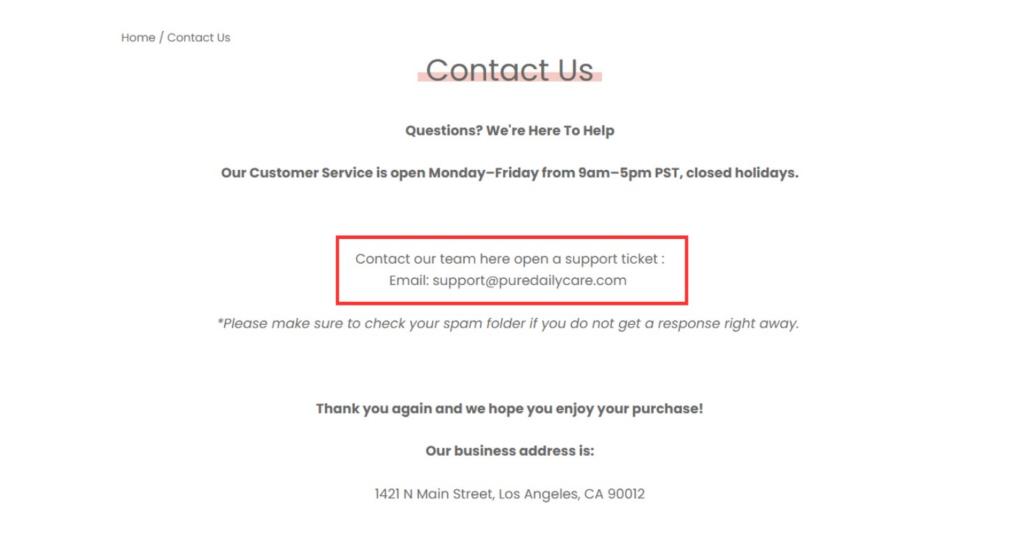
Here are some warm words you can use in your mail.
“Hello Pure Daily Care, I’ve been a regular visitor for quite some time, and I must say, the aesthetics and your products are impressive. Currently, I’m in talks with your Magento agency for a similar project. I’d love to hear about your experience working with them and your overall thoughts. Your insights will help me. Also, once my store is up and running, feel free to claim a backlink to your website.”
Most of the time, this trick will work. If you’re wondering about adding scores, you can add them depending on the amount of positive words you hear in clients’ feedback.
Instead of using approximate amounts, I’ve assigned full scores for each agency in my sheet. You can check it here.

And here the process ends, and it’s finally time to check the winners.
Who Are the Winners?
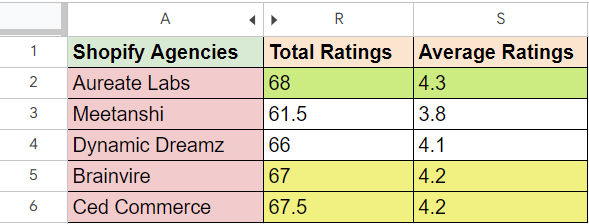
And here, we finally figured out the top Shopify agencies for us. You can follow this process for:
- As many criteria as you wish to add
- And evaluate as many agencies or freelancers as you want
Just because you want to start early, don’t rush into things. Follow this method, take your time, and then make a better decision to hire Shopify experts.
Now, it’s time we move to another section that shares simple steps you can follow to onboard Shopify experts.
Onboarding Shopify Experts
For many store owners, onboarding a service provider is overwhelming as they are unsure about the appropriate hiring process.
So, let’s see the step-by-step process that will help you onboard experts efficiently and smoothly.
1. Define Project Requirements and Scope
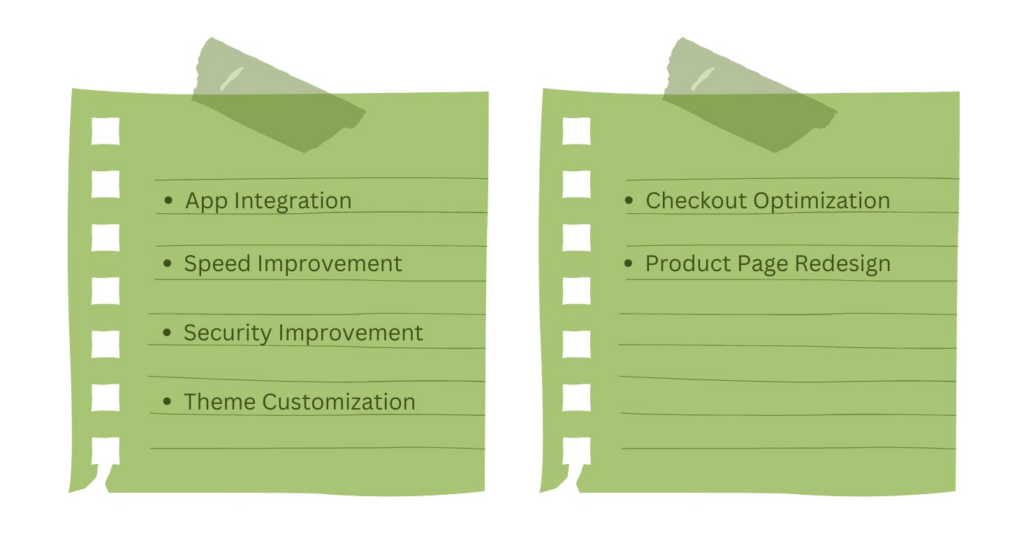
Having details and a clear project scope is always a plus point. So, start by figuring out what your Shopify project requires.
When you have all the details sorted out before you approach experts, you’ll be able to convey your project scope in the right way. And they can provide you with a clear timeline, budget, and results.
To do so, grab a pen and paper and write down each of your requirements:
- What are you trying to achieve?
- Are there specific features and functions you want?
- Any particular customizations you need?
- Do you have specific design preferences?
- What are your expectations?
Moreover, you can also jot down references from different online stores that you’d love to have on your store. It will help the Shopify expert understand your project better.
Once you put it all on paper, we can move to the next step of the onboarding process.
2. Determine the Budget and Project Duration
After your wishlist is ready, it’s time to fix the timeline and your budget. Don’t rush into things, just try to figure out:
- How much you can afford to spend on your project
- And how early it needs to be delivered
It’s not about figuring out exact numbers for the budget amount and delivery timing. Just note down approximates, as it helps experts convey the possibility of project delivery within that budget and timeline.
Once it’s done, get ready for interviews.
3. Interview the Shopify Experts
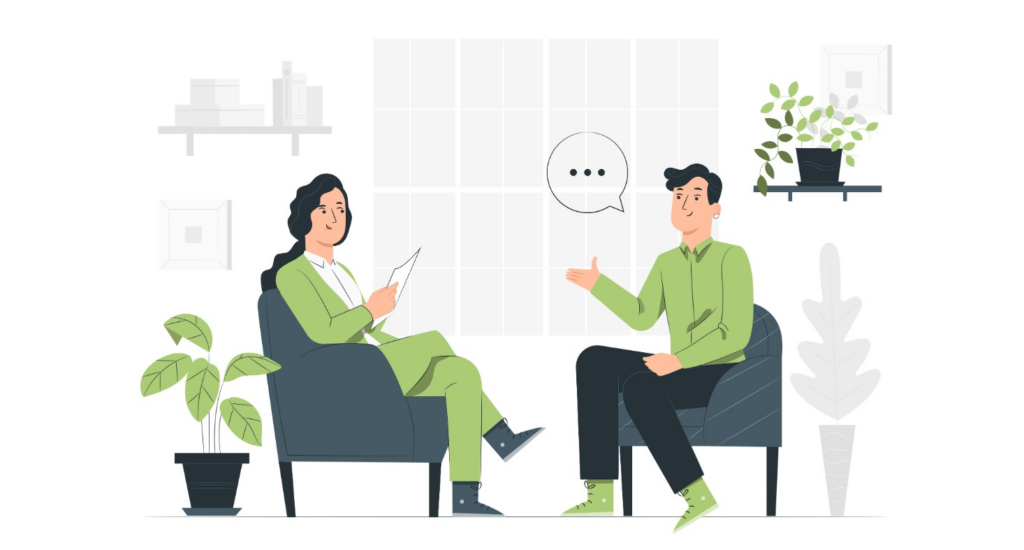
The previous section was about evaluating agencies and freelancers to figure out the best ones. So, at this point, you likely have discovered some great candidates that fit your criteria.
It’s time to schedule calls or in-person meetings with each of them. Here are some details you can discuss during the interview:
- Explain your project requirements, budget, and final deliverables.
- Ask the developers about the timeline and if any challenges are involved in the project.
- Inquire about how they plan on approaching your project to help you achieve your goals.
Developers who can clearly explain technicalities and have a clear vision of what your project requires are the ideal candidates, so consider them as green flags.
Once you identify some suitable candidates, move to discuss how you’ll settle the payment with them.
4. Negotiate the Payment Terms
There are hardly any chances where your budget matches developers’ expectations. This is where negotiation comes in. So, discuss your budget with the service provider, and try to negotiate till both parties agree on a single price.
Moreover, there are various hiring models that allow you to hire developers with different price tags, and here I’ve listed them:
- Hiring on an hourly basis
- Hiring on fixed project pricing
- Purchasing a service package
(For more information: How much does it cost to hire a Shopify expert?)
Once you finalize project cost and payment terms, you can move to determine communication modes with the expert.
5. Finalize the Communication Channels
Communication is key to success. But most store owners miss this step, which turns into nothing but chaos later on.
Using multiple communication modes or mediums can lead to misunderstandings, delays, and a lack of clarity in project updates. It can create disconnection and hinder the smoother flow of information, making your collaboration challenging.
So, to avoid this mess, decide how to communicate with the expert you’re hiring, right from the start. If you’re confused about communication channels that experts highly prefer, let me list down some.
- For project-related information: Jira, Trello, or Asana
- For informal communication: Slack, Microsoft Teams, and more
Once you’re done deciding on the channels to communicate and have followed all the steps we discussed above, move on to make an official deal.
6. Prepare and Sign the Contract
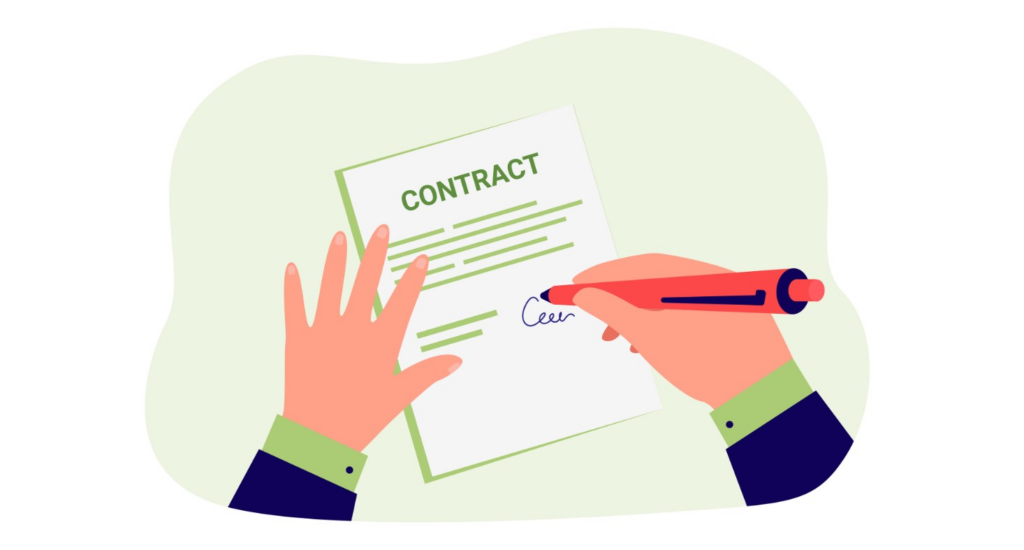
Once you have finalized the Shopify expert and discussed each project detail with them, it’s time to take the final step — signing a contract!
Make sure your contract includes the project scope, timelines, payment terms, confidentiality agreements, and any other relevant terms and conditions. This is to protect both parties’ interests and helps ensure a smooth relationship with your service provider.
And congratulations! You have successfully onboarded a Shopify expert to work on your project requirements.
Final Words
Our guide on how to hire a Shopify expert ends here.
We know that finding the perfect match for your store is a big mountain to climb. However, I hope this guide has made it easier for you to choose between freelancers and agencies, find them, evaluate their skills, and smoothly onboard them.
As you start your hiring process, remember that hiring a Shopify expert is about finding someone who can handle your job and help your Shopify store grow. So, don’t settle for anyone less than the right person.
Moreover, to find and onboard a Shopify expert without any hassle, you can always choose Shopify experts from Aureate Labs. Let’s conclude this guide by understanding the exceptional benefits they come with.
Hiring Shopify Experts from Aureate Lab!
Let’s do an introduction first.
We Aureate Labs, are the leading eCommerce development company providing a range of Shopify services. Whether your project is development, customization, store setup, designing, or marketing; we have experienced professionals for all your Shopify needs.
And here I’ve listed some of the benefits you can avail when you choose us.
- 10 hours free trial
- 10+ years of experience in Shopify
- Free post-development support services
- Option to rollover service hours
- Cost-effective rates, as we’re an Asia-based Shopify agency
- A joyous team of developers
- And a great client to work on your Shopify requirements
For more information, you can visit our Shopify services. And, what’s holding you back from discussing your queries? Contact us today.






Post a Comment
Got a question? Have a feedback? Please feel free to leave your ideas, opinions, and questions in the comments section of our post! ❤️